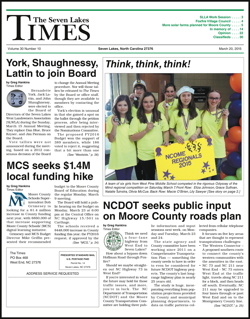 Issues ranging from the water supply to fire districts were on the agenda when the Moore County Board of Commissioners met with the Greater Seven Lakes Community Council [GSLCC] on Thursday, August 16.
Issues ranging from the water supply to fire districts were on the agenda when the Moore County Board of Commissioners met with the Greater Seven Lakes Community Council [GSLCC] on Thursday, August 16.
Developing a strategy -- and an agreement -- that would allow Moore County Public Utilities [MCPU] to build a new water treatment plant and tap into the Town of Robbins' reservoir remains the front-burner option for bringing more water to Seven Lakes and the rest of Southern Moore County.
The key to that strategy will be placing a run-of-river intake in the Deep River, in order to pipe water from that source to the reservoir and treatment plant. A recent meeting with NC Department of Environment and Natural Resources officials revealed that Bear Creek -- once Robbins' source of water -- can't supply enough to serve as a primary source for the County.
Public Works Director Randy Gould explained that, if the County decides to build a water plant in Robbins, the Deep River will serve as its primary source of water, with the possibility of using Bear Creek water as a supplement.
“We have made some progress,” Gould said, of the county's effort to expand its water supply, “and have some options that are further down the road than they were last year.”
Much of the water the County produces currently comes from wells in the Pinehurst area, and MCPU is currently conducting a study that will provide some indication of the amount of water that is available in the aquifer that feeds those wells.
The study will also determine how much radium is in the aquifer, which will help in the selection of well sites. Several county wells have been contaminated by radium in the past.
Gould said the most likely short-term water-supply initiatives include the drilling of three wells in Stonehill Pines, and, perhaps, bringing additional water from Harnett County through a new pipeline on NC Highway 73. But the Commissioners have yet to give the go-ahead on these initiatives, or on the Robbins option.
No matter which options the County chooses to bring more water into the system, water system customers will ultimately pay for those upgrades.
“There’s no doubt that users will have to pay the freight,” said Gould. “But, if we don’t do something, we won’t have adequate water for the future, based on the population projections.”
Gould said any new residential developments between Pinehurst and Seven Lakes -- like Pine Forest -- would have to bear the cost of acquiring additional water for their residents, before they can begin building out the development. Planning Director Debra Ensminger noted that no progress had been made toward developing Pine Forest since the Board of Commissioners approved the rezoning of the property last September.
Hydraulic Fracturing
The Seven Lakes Council had asked the Commissioners to address the issue of hydraulic fracturing, more commonly known as “fracking,” a method of drilling for natural gas.
The Board passed a resolution several weeks ago asking the NC General Assembly to preserve the right of local governments to regulate fracking within their borders, in part to protect water supplies.
However, Commissioner Nick Picerno explained, the legislators in Raleigh did not include the local regulatory options in the fracking bill they ultimately passed, which means regulation of this type of gas exploration rests solely with the state.
County Budget and Taxes
The FY 2012-2013 County Budget, which was adopted in June, cut county spending and did not include a tax increase, County Manger Cary McSwain told the Community Council.
Since the 2008 economic downturn, the County has worked hard to decrease spending while maintaing services, he said.
That was made even more difficult because reduced consumer spending has cost the county almost $5 million in decreased sales tax collections, Commissioner Picerno added.
“We knew we had to make government more efficient,” he said.
The General Assembly meets next year for its biennial “long session,” said McSwain, who fears the state will try to pass expenses down to the counties. “When the General Assembly’s doors open, the counties are in trouble,” he said.
The Commissioners will meet for a mini-retreat this Fall to discuss next year’s budget, with a more detailed retreat in January.
“The way we approach it as a Board . . . we are very conservative with your money,” said Picerno, “We know it’s your money, not ours.”
A property tax revaluation will be conducted in 2015, said Tax Administrator Wayne Vest, who added that current assessed values are in line with the County's overall housing market.
Noting that values within some areas of the County are faring better than others, Vest said the upcoming revaluation will reflect those differences. Housing sales between now and 2015 will determine the new assessed values.
Vest said that, typically, foreclosed properties will not impact the equation for tax assessments. Those wanting more more information regarding a particular area or neighborhood should contact the tax office, Vest said.
Commissioner Picerno said the goal is to have a “neutral assessment’ in 2015 -- in other words, the tax rate would be adjusted upward or downward so that the same total amount of tax revenue is collected.
Veterans' Memorial
A committee will be formed to create a resolution to resolve the long and short term issues regarding the Veterans' Memorial and the land that surrounds it in Carthage, explained Commissioner Jimmy Melton.
Two Commissioners and six Veterans representatives will make up the committee. In the meantime, the Board has passed a resolution to make clear that the property surrounding the Memorial is not available for sale.
“It’s not on the market, it’s not for sale, it’s not for anything, until the committee has had time to do its work,” said Picerno.
A representative of the Bojangles' restaurant chain approached the County in October 2011 with an offer to purchase 1.3 acres near the Memorial. The Commissioners discussed that offer in three closed sessions.
Since the offer was made public in May, a growing number of Veterans have been turning out for Board of Commissioners meetings to protest the location of the restaurant and to urge the County to protect the area.
The Board voted during their Tuesday, August 7 meeting to form the new committee on the Memorial and to make clear that the land around it is not currently for sale.
An idea floated in that meeting by Commissioners Chairman Larry Caddell would keep the land around the Memorial as “open space” co-owned by the Veterans and the County, with the upkeep and insurance payments being taken care of by the County.
Fire Districts Update
Fire Marshall Ken Skipper said the County’s fire districts are still under review by an outside consultant; a final report should be presented by February 2013.
“We will not blindly change districts without knowing what the full impact is,” Skipper said.
McLendon Hills raised the issue of fire district insurance ratings earlier this year, asking the Board of Commissioners to move the community from the Eagle Springs district into the Seven Lakes district.
Not only is the Seven Lakes fire department closer to McLendon Hills, but moving into the Seven Lakes district would decrease insurance rates for homeowners, due to the district's lower fire insurance rating. However, it would take a big bite out of the fire tax revenues supporting the Eagle Springs department.
Commissioner Tim Lea said the goal is to have a flat tax for all fire districts in the County.
Skipper explained that any changes to fire districts will need to be done by July 2013, when the new tax year will begin.
Other Business
Other business discussed by the Commissioners and the Greater Seven Lakes Community Council included:
• The Moore County Land Use Plan is under active review by a steering committee, said Planning Director Ensminger. The committee has met five times and will meet again on Monday, August 27, at the Senior Enrichment Center from 6:00pm to 8:00pm. “We have had very little participation from the community,” said Ensminger, who encouraged interested citizens to attend the open meetings. The plan serves as the overarching vision that informs zoning and development regulations.
• Assistant County Manager Ken Larking briefed the Council on the County’s GIS system, explaining how it helps with EMS, Public Utilities, and the tax administrator’s office, among others.
• The Board had a member of the Moore County Sheriff's Office address concerns raised by the Council about safety issues surrounding a sweepstakes business that recently opened in Seven Lakes. One member of the audience noted that, if Seven Lakes were incorporated, the town would be able to keep such businesses out of the community.
The Greater Seven Lakes Community Council was represented at the Meeting by President Pete Dotto of the McLendon Hills Property Owners Association, Seven Lakes West Landowners Association President Mick Herdrich, and Seven Lakes Business Guild President Karen Milligan. Both Commissioner Craig Kennedy and Chairman Larry Caddell were absent from Thursday’s meeting, as was GSLCC member Bob Darr, President of the Seven Lakes Landowners Association.
